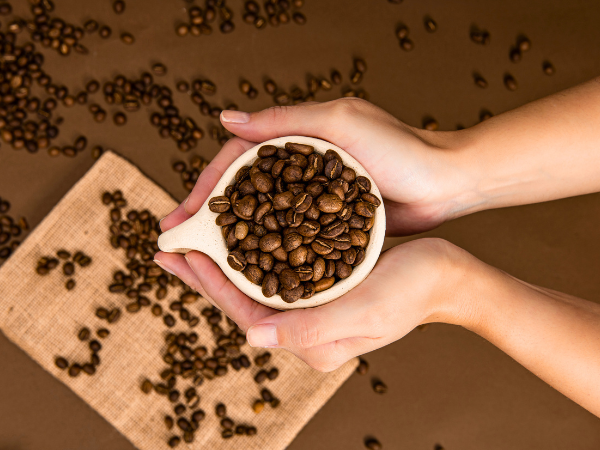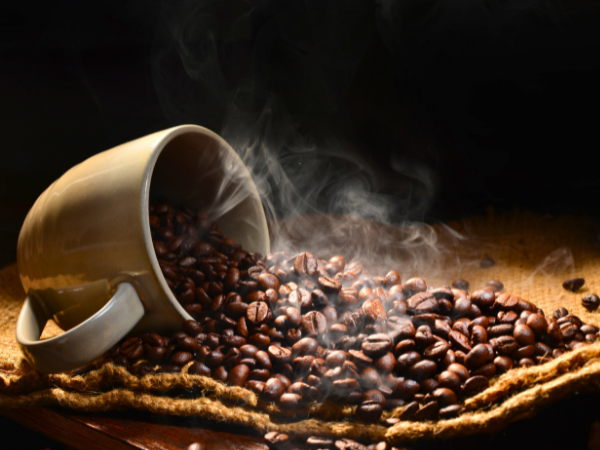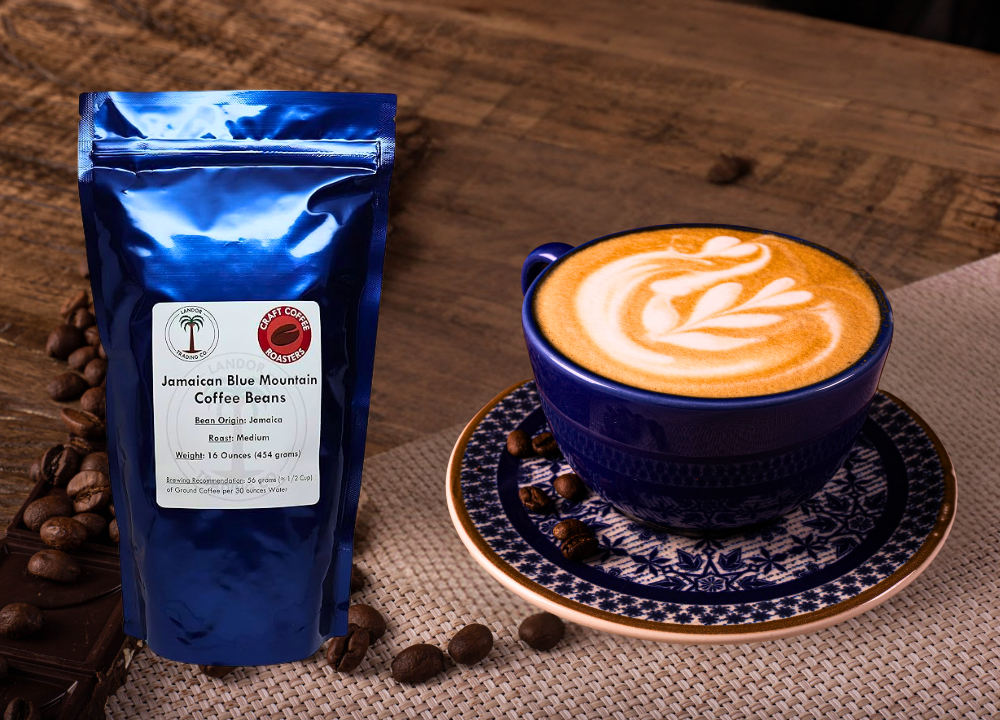This coffee comes from the Blue Mountains in Jamaica, where the climate and soil create perfect growing conditions. Farmers carefully cultivate each bean by hand. The result is a coffee that many consider the best.
What Is Jamaican Blue Mountain Coffee?
Jamaican Blue Mountain Coffee is one of the most sought-after coffees in the world. Known for its smooth flavor and mild acidity, it stands out among coffee lovers. This coffee comes from the Blue Mountains of Jamaica, a region famous for its unique growing conditions.
The Unique Origins Of Jamaican Blue Mountain Coffee
The Blue Mountains of Jamaica provide a perfect environment for coffee cultivation. Here are some key factors that contribute to the exceptional quality of Jamaican Blue Mountain Coffee:
- High Altitudes: Traditionally, coffee qualifies as Jamaica Blue Mountain only if grown at altitudes ranging from 910 metres (3,000 ft) to 1,700 metres (5,500 ft).
- Rich Soil: The volcanic soil in this region is rich in nutrients. This enhances the flavor profile of the beans.
- Climate: The unique climate, with ample rainfall and mist, ensures that coffee plants thrive.
The coffee is cultivated by local farmers who use traditional methods. The process is labor-intensive, ensuring high-quality beans. Here is a simple table that outlines the growing conditions:
| Factor | Description |
|---|---|
| Altitude | 3,000 to 5,500 feet |
| Soil Type | Volcanic and nutrient-rich |
| Climate | Cool temperatures and regular rainfall |
This unique combination of factors results in exceptional beans. The flavor is smooth, with hints of chocolate and floral notes. Each cup of Jamaican Blue Mountain Coffee offers a taste of its unique origins.
The History And Prestige Of Blue Mountain Coffee
The history of Jamaican Blue Mountain Coffee is rich and fascinating. Its journey began in the 18th century when coffee was first introduced to Jamaica. Today, it holds a prestigious reputation worldwide.
Here are some key points in its history:
- Introduced in 1728: Coffee plants were brought from the French colony of Martinique.
- Grown by Local Farmers: Farmers started cultivating coffee in the Blue Mountains, taking advantage of the ideal conditions.
- Global Recognition: By the early 20th century, Jamaican Blue Mountain Coffee gained fame in international markets.
Today, it is one of the most expensive coffees globally. The coffee is often associated with luxury and quality. Many coffee lovers seek it out for its rich flavor and smooth finish. The term “Blue Mountain” has become synonymous with excellence.

What Does Jamaican Blue Mountain Coffee Taste Like?
This coffee offers a delightful experience with its rich flavors. Let’s dive into the flavor profile and see how it compares to other coffees.
The Flavor Profile Of Blue Mountain Coffee
The flavor of Jamaican Blue Mountain Coffee is truly special. It features a smooth and rich taste that many enjoy. The coffee is known for:
- Notes of chocolate: A subtle hint of sweetness that adds depth.
- Floral undertones: A delicate aroma that enhances the overall experience.
- Balanced acidity: A crisp and refreshing finish that is not too sharp.
These unique flavors create a well-rounded cup of coffee. Many drinkers describe it as mild yet flavorful. It lacks the bitterness often found in other coffees. Instead, it offers a smooth, clean taste that appeals to many palates.
To summarize the flavor profile, here’s a simple table:
| Flavor Element | Description |
|---|---|
| Chocolate Notes | Subtle sweetness that enriches the flavor. |
| Floral Undertones | Light aroma that adds complexity. |
| Balanced Acidity | Crisp finish that enhances drinkability. |
What Coffee Is Similar To Jamaican Blue Mountain?
Finding a coffee similar to Jamaican Blue Mountain can be challenging. However, some options capture its essence. These coffees share similar taste profiles:
- Hawaiian Kona Coffee: Offers a smooth and rich flavor.
- Guatemalan Antigua: Known for its balanced acidity and chocolate notes.
- Ethiopian Yirgacheffe: Features fruity and floral flavors with a light body.
Each of these coffees has unique characteristics. Yet, they all offer some elements found in Jamaican Blue Mountain Coffee.
Consider these factors when exploring alternatives:
- Flavor notes: Look for chocolate or floral hints.
- Acidity level: Seek a balanced acidity for a smooth finish.
- Body: A medium to light body often aligns with Blue Mountain’s smoothness.
These similarities make them enjoyable for those who appreciate Jamaican Blue Mountain Coffee.
The Growing And Processing Methods Blue Mountain Coffee
The coffee is grown in the high-altitude regions of the Blue Mountains, where the climate is perfect for producing high-quality beans. Farmers use specific techniques to ensure the best quality and sustainability.
Sustainable Practices In Blue Mountain Coffee Farming
Farmers in the Blue Mountains prioritize sustainability. They focus on methods that protect the environment and promote biodiversity. This careful approach helps maintain the rich ecosystem of the region. Here are some sustainable practices:
- Shade-grown coffee: Trees provide shade, helping to preserve soil health.
- Organic farming: Reduces chemical use, promoting healthier plants.
- Water conservation: Efficient irrigation methods save water.
- Diverse crops: Growing different plants boosts biodiversity.
Many farmers follow strict environmental and ethical standards in coffee production. These standards help ensure that coffee is grown responsibly. The following table highlights some key sustainable practices:
| Practice | Description |
|---|---|
| Shade Grown | Uses trees to provide natural shade for coffee plants. |
| Organic Methods | Avoids synthetic fertilizers and pesticides. |
| Water Management | Uses efficient irrigation systems to conserve water. |
| Biodiversity | Encourages planting various crops alongside coffee. |
These practices not only protect the environment but also enhance the quality of the coffee. The care taken in growing helps make Jamaican Blue Mountain Coffee a premium choice.
How Is It Processed?
The processing of Jamaican Blue Mountain Coffee is vital for its quality. The art of wet processing is the preferred method. This technique involves several steps that ensure the best flavor and aroma. First, ripe coffee cherries are handpicked. Next, they are washed to remove dirt and debris.
After washing, the cherries undergo fermentation. This step helps separate the coffee beans from the pulp. Once fermentation is complete, the beans are washed again and then dried. Proper drying is essential for preventing mold.
Here’s an overview of the wet processing steps:
- Handpick ripe cherries.
- Wash cherries to clean them.
- Ferment cherries to separate beans.
- Wash the beans again.
- Dry the beans in the sun.
This method not only enhances flavor but also maintains quality control. By focusing on environmental and ethical standards in coffee production, farmers ensure the beans are treated with care. The result is a cup of coffee that is not only delicious but also responsibly sourced.

How To Brew Jamaican Blue Mountain Coffee
Brewing this exquisite coffee correctly is essential to enjoy its full potential. Here’s how to brew Jamaican Blue Mountain Coffee to achieve the best flavor possible.
Best Brewing Methods For Blue Mountain Coffee
Different brewing methods can bring out the best in Jamaican Blue Mountain Coffee. Each method highlights unique flavors and aromas. Here are some popular brewing methods:
- Pour-Over: This method allows for precise control over water flow and brewing time.
- French Press: This method enhances the coffee’s body and richness.
- Espresso: A quick method that captures the coffee’s bold flavors.
Choosing the right method depends on personal taste. Here’s a brief overview of how to brew with each method:
| Method | Grind Size | Water Temperature | Brewing Ratio |
|---|---|---|---|
| Pour-Over | Medium-Fine | 200°F (93°C) | 1:16 (coffee to water) |
| French Press | Coarse | 200°F (93°C) | 1:15 |
| Espresso | Fine | 190°F (88°C) | 1:2 |
Experiment with these methods to find your favorite. Remember to adjust the grind size, water temperature, and brewing ratios for the best results.
Tips For Enhancing Flavor
Enhancing the flavor of Jamaican Blue Mountain Coffee requires attention to detail. Here are some tips to perfect your brew:
- Use Fresh Beans: Always use freshly roasted beans for a vibrant flavor.
- Store Properly: Keep your coffee beans in an airtight container away from light.
- Measure Carefully: Use a scale to ensure accurate coffee-to-water ratios.
- Experiment: Try different brewing methods to discover new flavors.
Pay attention to the following factors:
- Grind Size: Adjust grind size based on your brewing method.
- Water Temperature: Ensure the water is at the right temperature for extraction.
- Brewing Ratios: Experiment with different ratios to find your ideal strength.
By focusing on these elements, you can enhance the rich, smooth flavors of Jamaican Blue Mountain Coffee. Enjoy every sip of this exceptional brew.
Why Is Jamaican Blue Mountain Coffee So Expensive?
Several factors contribute to its cost, including limited supply and rigorous quality standards. Understanding these reasons helps appreciate this premium coffee even more.
Limited Supply And High Demand
The rarity of Jamaican Blue Mountain Coffee plays a significant role in its price. The coffee is grown in a small region of Jamaica, specifically in the Blue Mountains. The exclusive growing conditions make it ideal for producing high-quality beans. Key factors include:
- Altitude: The coffee grows at elevations between 2,000 and 5,500 feet.
- Climate: The area has a unique climate with cool temperatures and ample rainfall.
- Soil: Rich volcanic soil enhances the flavor profile of the beans.
Due to these specific conditions, production is limited. Here’s a quick overview:
| Factor | Impact on Supply |
|---|---|
| Growing Area | Only in the Blue Mountains of Jamaica |
| Harvest Season | Short window each year, typically from January to March |
| Production Volume | Less than 0.5% of global coffee production |
This limited supply leads to high demand, driving prices higher. Coffee enthusiasts and connoisseurs are willing to pay a premium for this exceptional brew.
Certification And Quality Assurance
Certification ensures that Jamaican Blue Mountain Coffee maintains its high standards. The Jamaican Coffee Industry Board oversees the certification process. Only coffee grown in the designated Blue Mountain area can be labeled as such. This process guarantees authenticity and quality. Important points include:
- The Importance of Authentic Blue Mountain Certification.
- Strict quality control measures are in place.
- Regular inspections ensure compliance with standards.
Here’s why certification matters:
| Certification Aspect | Benefit |
|---|---|
| Authenticity | Protects consumers from counterfeit products |
| Quality Control | Ensures consistent flavor and aroma |
| Market Value | Supports higher prices for farmers and producers |
Consumers can trust certified products. This trust contributes to the high price of Jamaican Blue Mountain Coffee. The combination of limited supply and strict quality assurance makes this coffee a true luxury.
How To Tell Authentic Jamaican Blue Mountain Coffee
Knowing how to tell authentic Jamaican Blue Mountain Coffee is essential. This guide will help you recognize the genuine product and avoid disappointments.
Certification And Quality Assurance
To ensure you buy authentic Jamaican Blue Mountain Coffee, check for certification. The Coffee Industry Board of Jamaica is responsible for regulating this coffee. They provide quality assurance through a certification process. Here are key points to consider:
- Look for the official seal from the Coffee Industry Board.
- The packaging should clearly state “Jamaican Blue Mountain Coffee.”
- Check for the country of origin: Jamaica.
- The beans should be 100% Arabica, known for their superior quality.
Here is a table summarizing certification features:
| Feature | Description |
|---|---|
| Official Seal | Must have the Coffee Industry Board’s seal. |
| Origin | Should clearly state “Jamaica.” |
| Bean Type | 100% Arabica only. |
Buying from reputable sellers helps ensure quality. Always check these details before purchasing.
Spotting Fakes In The Market
Many fake products are on the market. To avoid them, be vigilant. Recognizing Official Blue Mountain Coffee Seals is crucial. Here are tips for ensuring you’re buying the real deal:
- Beware of prices that are too low. Authentic Blue Mountain Coffee is premium and costs more.
- Check the packaging. It should be high-quality and not damaged.
- Read reviews about sellers. Buy from trusted sources.
Some signs of fake coffee include:
- Poor flavor and aroma.
- Labels that lack certification.
- Beans that look different than expected.
When purchasing, ask questions. A reputable seller should be knowledgeable. They will provide clear information about their products. Trust your instincts. If something feels off, it might be a fake.
Where To Buy Jamaican Blue Mountain Coffee
Finding genuine Jamaican Blue Mountain Coffee can be tricky. Many retailers sell fake or lower-quality beans. This guide will help you locate trusted sources. Enjoying this coffee starts with knowing where to buy it.
Trusted Retailers And Online Stores
When purchasing Jamaican Blue Mountain Coffee, choose trusted retailers. Authentic beans come with a certification. This certification shows the coffee is grown in the Blue Mountains of Jamaica. Here are some reliable options:
- Local Coffee Shops: Many local shops carry authentic Jamaican Blue Mountain Coffee. Ask for their source.
- Specialty Stores: Look for specialty stores that focus on high-quality coffee.
- Online Retailers: Numerous online shops sell Jamaican Blue Mountain Coffee. Make sure they have good reviews.
Here is a table of some trusted online stores:
| Store Name | Website | Notes |
|---|---|---|
| Amazon | www.amazon.com | Wide selection, check reviews |
| Jamaican Blue Mountain Coffee Company | www.jamaicanbluemountaincoffee.com | Specializes in authentic beans |
| Peet’s Coffee | www.peets.com | Reputable brand, quality assurance |

